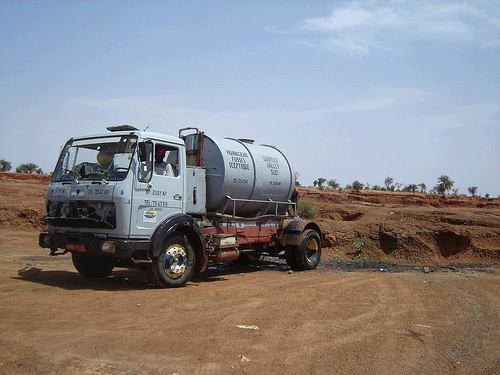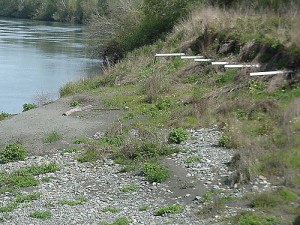
Hauler spreading septic waste to land. Image: 4Cheungs via Flickr
Untreated human waste from failing septic tanks is increasingly common and could pose serious health problems, health authorities say.
The upkeep of those tanks – used in mostly rural areas without sewer systems – is expensive. That’s increasingly so with the growing restrictions on how to dump their contents.
Several local governments in Michigan ban the disposal of human waste from septic tanks onto lawfully designated fields.
State Rep. Ken Goike, has introduced legislation to keep them from doing that and to hold disposal costs down.
“The bill was created to ban ordinances that make it costlier to maintain septic tanks,” said Goike, a Michigan Republican from Ray Township in Macomb County. Michigan.
There’s growing concern from septic tank owners about the growing costs of transporting waste to treatment facilities which in some cases are up to 80 miles away, said Kyle Kaminski, Goike’s legislative director.
“Most of these folks resist having their tanks pumped out just because they don’t want to pay more to have it disposed,” he said.
But saving bucks on maintenance could lead to failure of septic systems which may demand an overhaul, according to the U.S. Department of Public Health.
That may lead to an overflow, releasing untreated human waste into the ground and nearby streams, causing a health hazard.
Under Goike’s bill, counties, municipalities, townships, villages and other local governments could still ban the spread of septic waste to land. But to do so, they would be required to provide septic treatment plants that:
- Serve the entire region.
- Have the capacity to treat all septic waste produced within that region.
- If privately owned, be bound by contract to accept all septic waste produced within the region.
To reduce the septic waste on land, the bill would guarantee that waste from tanks within 25 miles of a treatment plant is disposed there.
But those outside this boundary can apply waste on designated land following guidelines by state regulators Kaminski said.
The agency requires all septic waste be treated prior to spreading on any field to reduce disease transmission and odor. The land must also not be too sloppy and the waste must be tilled into the soil within 48 hours to reduce run-off.
Land application is the most common disposal method in the country because of its affordability and because it’s a way of recycling organic matter back into the soil, if applied properly, according to several studies.
Michigan’s Jackson County is one of three in the state that have passed the “no land application” ordinance.
“Pollution of our lakes was getting out of hand and so we decided to take matters into our hands,” said Geoff Snyder, the county’s drain commissioner.

Ill maintained, leaky and overflowing septic tank pose risks to surface waters. Image: Thewellman via Flickr
A county study attributed the growing amount of nutrients in the county’s numerous lakes to human waste and prompted the ordinance, he said.
The county is the head waters of major river basins including the Grand, Kalamazoo and Huron rivers. It’s also home to about 50 inland lakes.
Soils near lakes are saturated with water and can’t absorb and treat septic waste. This makes it easier for contaminants to travel faster and longer distances into lakes and streams.
The hilly terrain of the county also doesn’t favor the application of septic waste to land, said Snyder. It increases run-off to the lakes which are all located in rural areas where land application is most common.
Fifteen years ago, the county and neighboring Washtenaw and Lenawee counties constructed a quarter-million-dollar sanitary and treatment facility for homes that surround these lakes.
“Effectively these homes cannot use septic tanks and must hook up to this system,” he said.
Snyder attributes the improved clarity of the lakes to the massive treatment plant.
Goike’s bill might not affect the county much.
All the septic tanks are within 25 miles of designated treatment plants that can serve the entire region, Snyder said.
Snyder said the introduced bill will not solve the county’s contamination problems because its main problem is limited land.
“Septic tank owners know they can’t pull another permit to build new drain fields and so they simply don’t report failing ones,” he said.
Banning the spread of human waste on land is the cost for maintaining public health, he said.
“We should address problems that are affecting our natural resources, not legislate around them,” he said.
How many septic tanks are out there is impossible to estimate. There are no central records and many tanks are not recorded because they were installed without authorization.
 SEPTIC SETBACKS
SEPTIC SETBACKS
This special report examines how ill maintained, leaky and overflowing septic tanks are polluting drinking water sources and causing serious health concerns in Great Lakes communities.
Wow, what a terrific last comment, opinion and outlook that County’s Drain Commissioner has, Michigan could use quite a few more like him, especially in elected positions!